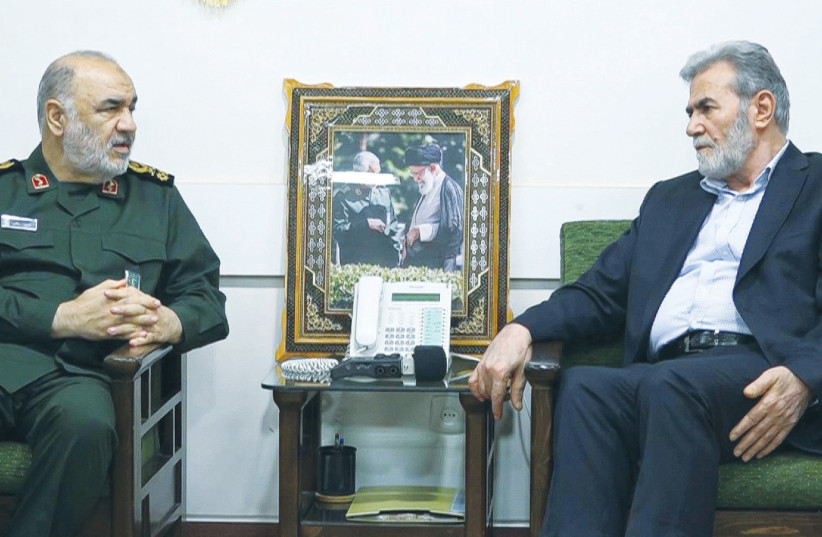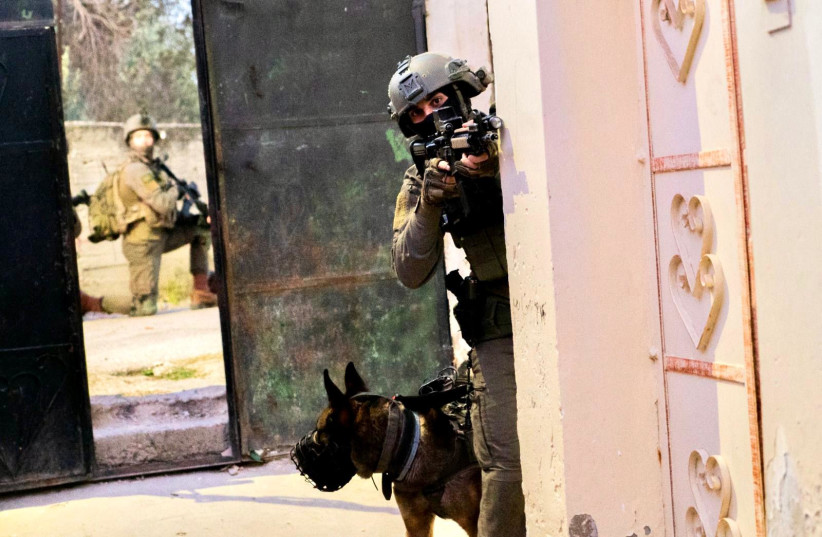While some of the turmoil is related to clashes between the Palestinians and the Israeli authorities over access to Temple Mount, the role of Iran should not be underestimated.

In the last few months, there has been a steady increase in terror attacks from the West Bank and in the West Bank. Between March and April, 20 Israelis were killed, prompting the IDF to launch Operation Break the Wave. Together with an effort to reinforce the separation fence, the military operation prevented terror attacks within the Green Line.
However, the unrest in the West Bank has only increased. It has become common for Palestinians to resist arrests of wanted Palestinians with weapons, and there have also been increased attacks on military personnel. The media reported that 60 shooting attacks were carried out against the Israeli army between January and late August.
On September 4, a bus with IDF recruits traveling in the Jordan Valley was attacked, wounding five troops. Ten days later, a senior officer was killed in a shootout with two Palestinians near the village close to Jenin. One of the attackers worked for the Palestinian Authority security forces.
The Israeli security establishment has been increasingly troubled about the situation. Senior officials blame Mahmoud Abbas for failing to stop the attacks. Still, they privately concede that the Palestinian Authority lost control over parts of the West Bank, notably the area around Jenin and Nablus. According to sources, Ronen Bar, the head of the Shin Bet (Israel Security Agency), told Barbara Leaf, assistant secretary of state for the Middle East, that it is unclear whether the PA can regain control.

What is Iran’s role in the Israeli-Palestinian clashes in the West Bank?
While some of the turmoil is related to clashes between the Palestinians and the Israeli authorities over access to Temple Mount, the role of Iran should not be underestimated. Indeed, in a recent speech, the chief of the Islamic Republic Revolutionary Corps, Maj.-Gen. Hossein Salami, credited the developments in the West Bank to a new strategy of “continuous resistance.”
“You witnessed conflicts and battles once in a while… every few years, there was a conflict and only in limited places with limited goals.”
IRGC chief Hossein Salami
Salami explained that in the past, “you witnessed conflicts and battles once in a while… every few years, there was a conflict and only in limited places with limited goals.” He noted that this was hardly satisfactory because, between the major operations such as the 2001-2002 suicide bombings and the 2022 Hamas rocket barrage, there were long periods of relative peace that benefited the “Zionist regime.” Changing intermittent to the continuous struggle between battles would undermine any sense of peace and normalcy of the “Zionists.”
That the “Palestinian resistance” was confined to Gaza was another negative in Salami’s view. The new strategy called to transfer struggle to the West Bank. “You hear the names of Jenin, Nablus, Ramallah, Tulkarm, Sheikh Jarrah… these are the main cities of the West Bank.”
The IRGC chief hinted that there were more ambitious plans afoot to include Green Line Israel in the rolling insurrection intifada. He promised that the Palestinians in the West Bank who could “only throw stones at soldiers “would be soon equipped with rockets: That is, there is no safe margin at any point for the Zionist regime to say that there is an area where the Zionists can take refuge and be safe from the fire of the Palestinians.”
If the rolling and multi-domain violence was the primary tool for undermining the normalcy of the occupation, the regime had some foreign policy benefits in mind. Tehran apparently hopes that the specter of Israeli forces waging operations in the territories of east Jerusalem and collective punishment such as closures and withdrawal of work permits would bring the Palestinian issue to the international agenda.
Even more importantly, the regime believes that daily turmoil transmitted on TV screens and social media would cripple the momentum of the Abraham Accords. The Islamic Republic has railed against the accords as a betrayal of the Palestinian cause with virtually no impact. Tehran was reportedly taken aback by the April 2022 Negev Summit, where Israel hosted the foreign ministers of UAE, Bahrain, Egypt and Morocco.
The IRGC-affiliated media commented that picking Sde Boker for the meeting was an affront to Arabs in general and the Palestinians in particular because there David “Ben-Gurion, the founder and first prime minister of the regime, built a house for himself and his wife.”
The regime understands that the Arab countries opted to collaborate with Israel because of concerns about its nuclear program and its destabilizing behavior in the region. Short of changing course, the regime’s only chance of undermining the accords is creating “Palestinian martyrdom.” Recent polls in Saudi Arabia and the Gulf States indicate that the public has a growing lack of support for the Abraham Accords.
For its part, Israel is well aware of Iran’s new strategy. Shin Bet head Bar asserted that the regime is “integrating armed insurrection into a hyper-intifada to build up a domestic front against Israel.” Israel’s own “war between the wars” strategy and the technological breakthroughs that it engendered, including the anti-missile interceptor, the Iron Dome, and precision bombing, are not helpful in facing the growing violence in the West Bank.
Shin Bet revealed that most of the attackers were individuals responding to the social media calls to join the “resistance.” The Israeli leadership knows that large-scale raids may inflame the situation and – in a worst-case scenario – bring down the corrupt and dysfunctional Palestinian administration.
It is unclear whether the military can weed out the Iranian-anointed “resistance” without triggering a major change to the West Bank status quo. Alluding to the risks involved in assuming control of the territories, Bar called Iran “not just a nuclear problem” but the “cause of much of the problem we are facing now in the Gaza Strip.”
The writer is a senior fellow at the Philos Project.
Content retrieved from: https://www.jpost.com/opinion/article-718522.